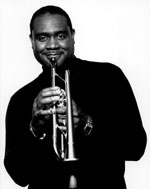|
|
TERELL STAFFORD QUINTET
Zankel Music Center, Skidmore College
Saratoga Springs, NY
June 27, 2017
by Joe Major
Usual pre-concert effervescence was momentarily quelled at the outset of Skidmore’s Jazz Institute Concert Series Tuesday night. Director Todd Coolman left the audience jarred by the announcement of legendary pianist and educator Geri Allen’s hours-before death.
After a reverent moment of silence the Terell Stafford Quintet proceeded to engrave a consummately polished, road-tested set in the glass-walled jewel box that is the Zankel Music Center. Trumpeter Stafford colluded with tenor saxophonist Tim Warfield, Bruce Barth on piano, David Wong on bass and drummer Billy Williams to deliver an engaging suite.
Their program was a celebration of the music, and equally, the impassioned spirit and good will of Lee Morgan. Throughout the jazz firmament Morgan stands as a paragon of muscular hard bop, committed heart and generous friendship. The band fixed its sights on those very same lofty goals, and the arcing trajectory of each number landed directly in the designated target zone.
They kicked off “Hocus Pocus” in the time-honored “hello, we’ll be your quintet tonight” round of solos. The tune’s buoyant snap perfectly exhibited their show and tell wizardry. Each of them in turn revealed, with the utmost magician’s confidence, the lightning they had caught in the bottle. The roiling unison segments generated even more sling and crackle to an already sprightly tempo.
The determined, stalking phrasing with which they offered up “Mr. Kenyatta” etched a portrait that was no mere trifle. Warfield’s tenor was at once probative and honorific. Stafford and Barth were no less resolute. Trumpet paced adamantly in the tense region just before notes start to splinter, and piano grabbed clustered hands full of descriptive solution to the equation being posed.
Next was an original, “Favor,” that Stafford dedicated to the enthusiasm of students and instructors at the Jazz Institute. He described it as a symbiotic, reciprocal state of exchanging grace, and the combo interplay immediately defined a bluesy gospel according to Terell. His burning, spiraling, insistent pealing was a testament to the intensity of his mission. Warfield’s burbling tenor sermon, though a touch somber, was none the less wrapped in irrepressible thankfulness. Barth, as heard all evening, had an ability to thoroughly drench the narrative, splaying his comping ascensions up the keyboard, here to an eerily spiritual climactic effect.
Throttling back, Stafford and Barth played a Morgan ballad, “Candy,” that, with muted trumpet, conveyed pure time capsule poignancy. The mute enabled a listener to hear the calendar pages flipping over the decades as trumpet and piano gently accompanied each other along Sweet Nostalgia Lane. Then they put a little fire under it, releasing magic memory. Barth sank his teeth in with a gentle rise of encyclopedic, fully elucidated back-story fervor, before Stafford buttoned things with a triumphant, almost equine “riders up!” finish.
Gearing in for a set-ending scorcher, Stafford mentioned how he’d been introduced to the closing tune. Shirley Scott had once prefaced it by saying, “It’s a Lee Morgan number, so now you’ll get to spit!” And indeed “Speedball” epitomized Morgan’s feisty, charging and braking tempo exhortations. Stafford jabbed and stuttered with stinging articulation. Everyone, Wong and Williams too, embraced this essence de adrenaline and began tossing red hot ingot licks.
Full stop; applause, applause, applause. They encored, again in signature Morgan fashion, totally immersed in the back and forth seismic shifting of “Yes I Can, No You Can’t.” Their unison playing seemed to slide and swing the considerable rhythmic heft effortlessly. Their point counterpoint voicing amped up a repartee that was already consistently taut and cogent, dramatic and slangy, and not least, imaginative.
Clad in homage and interpretation, unadorned by artifice, it remained the Terell Stafford Quintet’s direct drive and soulful lyricism that allowed their brilliant facets to be worn so well.
Joe Major is an inveterate jazz pilgrim for whom the holy grail is always the evocative communion of impression meeting expression. Living over the border in Williamstown, MA, for thirty-plus years, he’s been the grateful beneficiary of countless Williams College performances that have arranged themselves on his ever shifting life list. |

